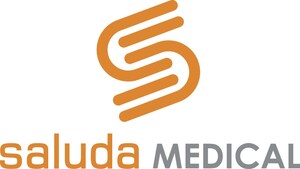
ARTARMON, Australia, Dec. 22, 2020 /PRNewswire/ -- Saluda Medical Pty Limited ("Saluda Medical") announced today that the UK's National Institute for Health and Care Excellence (NICE) issued a Medtech Innovation Briefing (MIB) titled "Evoke Spinal Cord Stimulator for managing chronic neuropathic or ischaemic pain." The MIB states Evoke would be used as a replacement option or alternative to current open-loop (fixed-output) spinal cord stimulation therapy in people with leg and back pain.
The Evoke Closed-Loop SCS System is the first and only SCS technology designed to measure the spinal cord's response to stimulation and make real-time, automatic adjustments intended to remain in the therapeutic range and provide long-term pain relief.
In addition to a review of the technology and published clinical evidence, comments from clinical experts were published including the following: Evoke could reduce hospital follow-up visits because of improved pain management over time, reduce the use of pain management medication, and reduce the reliance of clinicians on subjective feedback from patients. In summary, the experts said Evoke will become another option that can be considered for people with chronic pain and that it is likely to replace traditional implants used in the NHS.
Dr. Serge Nikolic, Consultant Lead for Neuromodulation at St Bartholomew's Hospital in London and experienced implanter of the Evoke System said, "The long-term results have demonstrated profound pain relief with no explants due to loss of efficacy. The NICE MIB provides support to my staff and peers who are considering using this new technology."
"NICE is a world-renowned source of clinical expertise for healthcare systems around the world. Today, we are delighted to see the NICE MIB support for the use of the Evoke Closed-Loop System," said John Parker, Founder and CEO, Saluda Medical. "We believe the power of measuring the spinal cord's response has moved the SCS field forward to a new frontier with the potential to improve long-term outcomes for patients around the world. We are grateful for the support of our clinical partners on this journey."
The NICE briefing can be accessed here: Summary | Evoke Spinal Cord Stimulator for managing chronic neuropathic or ischaemic pain | Advice | NICE
About Saluda Medical
Saluda Medical is a global neuromodulation company leading the development and commercialisation of data-driven, personalized therapies for patients with chronic pain. The company's first product, Evoke®, is a closed-loop spinal cord stimulation (SCS) system designed to treat chronic pain, a condition that affects more than 540 million people globally. SCS treats the condition by stimulating the spinal cord and altering the transmission of pain signals to the brain. Evoke is designed to optimise pain relief by measuring and recording each patient's unique response to stimulation, and making millions of real-time adjustments per day to maintain a consistent level of therapy.
In the U.S. EVOKE pivotal study, of which 12-month results were published in The Lancet Neurology, Evoke provided superior long-term overall pain relief compared to open-loop stimulation and set new clinical standards for functional improvements, sleep quality, quality of life, and opioid reduction, while reducing the need for follow-up visits for therapy reprogramming. Evoke is CE marked as an aid in the management of chronic intractable pain of the trunk and/or limbs. In the U.S., Evoke is currently under investigation through the first double-blinded, randomised, controlled U.S. pivotal study in SCS and is not commercially available. Saluda Medical is a privately held company with headquarters in Artarmon, New South Wales, Australia and has offices in Bloomington, MN, USA, and Harrogate, UK.
To learn more, visit www.saludamedical.com and connect with us on LinkedIn at www.linkedin.com/company/saluda-medical/.
SOURCE Saluda Medical







Share this article